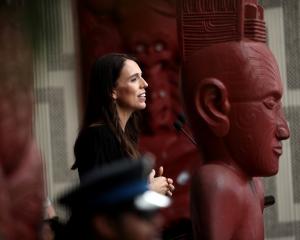Waitangi Day is often fraught with protests and dissent but, each year, there is hope New Zealand's national day will lead to closer recognition of the Treaty and what it means to the country as a whole.
The celebration of the signing of the Treaty of Waitangi was first held on February 6, 1934.
The signing was marked at the Treaty House, where a flagstaff had been erected to mark the spot where the Treaty had been signed, and at the nearby Te Tii Waitangi marae, where Ngapuhi hosted a gathering of some 10,000 Maori from across the country. The events leading to Waitangi start earlier than February 6, with the Governor-General and Prime Minister of the day arriving early to pay their respects to the hosts before the formal celebrations begin. Powhiri occur at regular intervals after visitors arrive.
Past days at Waitangi have been marked by protests as Maori, and others, aired grievances, using the day to voice opposition to the treatment of Maori in the wider community.
Prime Minister John Key, who will be at Waitangi today before leaving on a trip to Australia, has often said Maori are better off under his National-led Government than previous administrations. That is correct - up to a point.
Recently, Mr Key said in a statement to Parliament, that the Government will continue to progress the full and final settlement of historical Treaty of Waitangi grievances.
To date, 67 deeds of settlement have been signed. His Government has signed 41 of these in just five years. Completing all Treaty settlements has gone from an aspirational ideal to a realistic target. During 2013, the Crown signed eight deeds of settlement and Parliament sat in extended hours to progress 17 pieces of settlement legislation. Virtually all iwi are now engaged with the Crown. The achievement in itself is something most New Zealanders have no trouble in applauding.
Righting wrongs of the past is an important part of healing the wounds evident in our society. Minister of Treaty of Waitangi Negotiations Chris Finlayson has worked exceptionally hard to move along the settlements in the belief that the earlier they can be signed, the more quickly various iwi can move ahead with their own aspirations.
Sadly, what should be a day of recognition of New Zealand's identity is often a platform for extremists and the goodwill of the public has been eroded. Other events around the country have attracted wider participation as the years have progressed and as images from the Waitangi Treaty grounds have been dominated by conflict. Hopefully, the headway with Treaty settlements will help turn the day into an occasion to look to the future, rather than the past. It is in the interests of everyone to get the settlements concluded.
The progress Ngai Tahu has made in the South Island is proof that settlement money can be an economic stimulus. The Christchurch-based iwi is a business powerhouse owning tourism, hospitality, property and seafood assets. However, there are many downsides to Maori lives in New Zealand. Maori consistently rate lower in education achievements, violence is a major issue in some Maori-dominated communities and prison statistics do not favour Maori.
Activists often use language and actions designed to isolate the public from the debate. The public must put aside what is seen and heard at Waitangi to do what is best for the nation as a whole. New Zealanders must take ownership of Waitangi Day, and use it to progress both cultural and personal relationships. The day should be used to celebrate the success of this island nation, while at the same time not ignoring problems that need to be solved.
The challenge for all of us is to commit to achieving equal opportunity and to maximise advantages for the good of all individuals, whanau, hapu, iwi, and ultimately, New Zealand.









